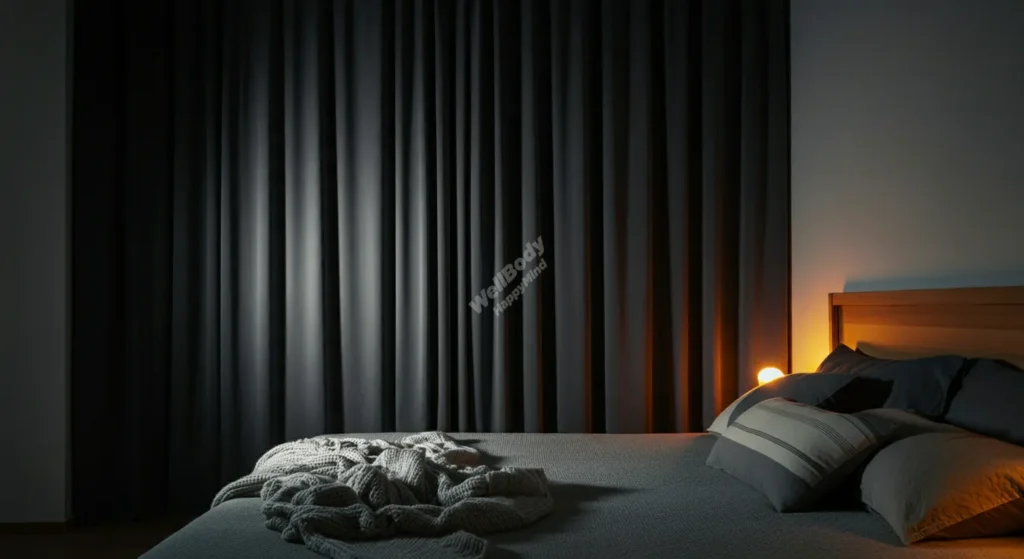The Connection Between Sleep Hygiene and Mental Health

Sleep is vital for our mental well-being. But many of us struggle to get quality rest. Good sleep hygiene can make a big difference. It involves habits that help us sleep better. This article will explore how sleep affects our mental health. We’ll look at ways to improve your sleep habits. By the end, you’ll have tools to boost your mental wellness through better sleep.
Did you know that 1 in 3 adults don’t get enough sleep? Poor sleep is linked to many mental health issues. It can worsen depression, anxiety, and stress. Good sleep hygiene can help prevent these problems. It can also improve existing mental health conditions.
In this article, you’ll learn:
- What sleep hygiene is and why it matters
- How poor sleep affects your mental health
- Tips for creating a sleep-friendly environment
- Strategies for developing healthy sleep habits
- When to seek professional help
Let’s dive in and discover how better sleep can lead to better mental health.
Understanding Sleep Hygiene
Sleep hygiene refers to habits that help you sleep well. It’s about creating the right conditions for good sleep. These habits can make a big difference in your sleep quality.
Good sleep hygiene includes several key components:
- A consistent sleep schedule
- A relaxing bedtime routine
- A comfortable sleep environment
- Healthy daytime habits
Many people make common sleep hygiene mistakes without realizing it. Here are some to watch out for:
- Using electronic devices before bed
- Drinking caffeine late in the day
- Exercising too close to bedtime
- Keeping an irregular sleep schedule
- Eating heavy meals right before sleep
Understanding sleep cycles is important for good sleep hygiene. Our bodies go through several sleep stages each night. These cycles affect our mental health in different ways.
During deep sleep, our brains process emotions and memories. REM sleep helps with learning and problem-solving. When we don’t get enough of these sleep stages, our mental health can suffer.
The sleep-wake cycle is controlled by our body’s internal clock. This clock responds to light and darkness. When we follow a consistent sleep schedule, we help our body clock stay on track. This can lead to better sleep and improved mental health.
How Poor Sleep Affects Mental Health
Poor sleep can have a big impact on our mental well-being. Let’s explore some key areas affected by lack of sleep.
Emotional Regulation
Sleep plays a crucial role in managing our emotions. When we don’t sleep well:
- We may feel more irritable or moody
- Our ability to handle stress decreases
- We might overreact to minor issues
- Positive emotions may be harder to maintain
Good sleep helps us process emotions. It allows our brain to reset and prepare for the next day.
Cognitive Function
Our thinking skills suffer when we don’t get enough sleep. Poor sleep can lead to:
- Difficulty concentrating
- Slower reaction times
- Problems with decision-making
- Reduced creativity
- Memory issues
Sleep helps our brain consolidate information. It’s like hitting the save button on our day’s experiences.
Stress Response
Lack of sleep can make us more vulnerable to stress. Here’s how:
- Our body produces more stress hormones
- We may feel overwhelmed more easily
- Our ability to cope with challenges decreases
- Anxiety levels may increase
Good sleep acts as a buffer against stress. It helps our body and mind recover and prepare for new challenges.

Relationship Between Sleep and Mental Health
The connection between sleep and mental health is a two-way street:
| Poor Sleep Leads To | Mental Health Issues Lead To |
|---|---|
| Increased anxiety | Difficulty falling asleep |
| Heightened stress | Frequent night awakenings |
| Mood swings | Early morning awakening |
| Reduced emotional resilience | Excessive daytime sleepiness |
This cycle can be hard to break. Improving sleep hygiene can help interrupt this pattern and promote better mental health.
Mental Health Conditions Linked to Sleep Problems
Sleep issues often go hand-in-hand with mental health conditions. Let’s look at some common disorders and their connection to sleep.
Depression and Sleep
Depression and sleep problems are closely linked. Here’s what you need to know:
- Many people with depression experience insomnia
- Some may sleep too much (hypersomnia)
- Poor sleep can worsen depression symptoms
- Improving sleep may help alleviate depression
Sleep disturbances can be an early warning sign of depression. Addressing sleep issues might help prevent or manage depressive episodes.
Anxiety Disorders
Anxiety and sleep problems often feed into each other. Consider these points:
- Racing thoughts can make it hard to fall asleep
- Sleep deprivation can increase anxiety symptoms
- Panic attacks may occur during sleep
- Good sleep can help reduce anxiety levels
Bipolar Disorder
Sleep patterns often change with bipolar episodes. Here’s how:
- Manic episodes may lead to reduced need for sleep
- Depressive episodes might cause oversleeping
- Irregular sleep patterns can trigger mood episodes
- Stable sleep routines are crucial for managing bipolar disorder
ADHD (Attention-Deficit/Hyperactivity Disorder)
ADHD and sleep issues frequently co-occur. Key points include:
- Difficulty falling asleep is common in ADHD
- Sleep problems may worsen ADHD symptoms
- Some ADHD medications can affect sleep
- Improved sleep can help manage ADHD symptoms
It’s important to note that sleep problems don’t always indicate a mental health condition. However, persistent sleep issues warrant attention. They may be a sign of an underlying problem or could lead to mental health challenges if left unaddressed.
Creating a Sleep-Friendly Environment
Your bedroom plays a crucial role in your sleep quality. Let’s explore how to optimize your sleep space.
Bedroom Setup Recommendations
A well-designed bedroom can promote better sleep. Consider these tips:
- Keep your room dark. Use blackout curtains if needed.
- Invest in a comfortable mattress and pillows.
- Choose breathable bedding to regulate temperature.
- Remove clutter to create a calm atmosphere.
Temperature and Lighting
These factors significantly impact your sleep:
- Aim for a cool room. 60-67°F (15-19°C) is ideal for most people.
- Use dim, warm lighting in the evening to signal bedtime.
- Avoid bright lights before sleep. They can disrupt your body clock.
Noise Management
Unwanted sounds can disturb your sleep. Try these solutions:
- Use a white noise machine to mask disruptive noises.
- Try earplugs if your environment is noisy.
- Consider soundproofing your bedroom if noise is a persistent issue.
Electronics and Blue Light
Electronic devices can interfere with sleep. Here’s what to do:
- Avoid screens for at least an hour before bed.
- Use blue light filters on devices if you must use them.
- Keep TVs and computers out of the bedroom.
- Charge your phone away from your bed to avoid nighttime use.

Sleep Environment Checklist
Use this quick checklist to ensure your bedroom is sleep-friendly:
- [ ] Room is dark and cool
- [ ] Bed is comfortable and inviting
- [ ] Noise is minimized or masked
- [ ] Electronics are out of sight
- [ ] Room is clean and clutter-free
- [ ] Relaxing scents are used (optional)
Remember, everyone’s ideal sleep environment may differ slightly. Experiment to find what works best for you. Small changes can lead to big improvements in your sleep quality.
Developing Healthy Sleep Habits
Good sleep habits can significantly improve your sleep quality. Let’s explore some key strategies.
Consistent Sleep Schedule
Regularity is crucial for good sleep. Here’s why:
- Go to bed and wake up at the same time daily.
- This helps regulate your body’s internal clock.
- Try to maintain this schedule even on weekends.
- Your body will naturally start to feel sleepy at bedtime.
Pre-Bedtime Routine
A relaxing routine signals your body it’s time to sleep:
- Start winding down 30-60 minutes before bed.
- Try calming activities like reading or gentle stretching.
- Avoid stressful conversations or tasks before sleep.
- Practice relaxation techniques like deep breathing.
Diet and Exercise Considerations
What you eat and how you move affects your sleep:
- Avoid large meals close to bedtime.
- Limit caffeine and alcohol, especially in the evening.
- Exercise regularly, but not too close to bedtime.
- Stay hydrated, but reduce fluid intake before bed.
Stress Management Techniques
Stress can keep you awake. Try these methods to relax:
- Practice mindfulness or meditation before bed.
- Keep a worry journal to offload anxious thoughts.
- Try progressive muscle relaxation to release tension.
- Use aromatherapy with calming scents like lavender.
Step-by-Step Guide to Better Sleep
- Set a consistent sleep schedule.
- Create a relaxing pre-bed routine.
- Optimize your sleep environment.
- Manage stress and anxiety.
- Be mindful of diet and exercise.
- Limit daytime naps to 20-30 minutes.
- Avoid clock-watching if you can’t sleep.
- Get morning sunlight to help regulate your body clock.
Remember, developing new habits takes time. Be patient with yourself. Consistent effort will lead to better sleep and improved mental health.
When to Seek Professional Help
Sometimes, sleep problems need expert attention. Let’s explore when and how to get help.
Warning Signs and Symptoms
Watch for these red flags:
- Persistent difficulty falling or staying asleep
- Excessive daytime sleepiness
- Loud snoring or gasping during sleep
- Chronic fatigue despite adequate sleep time
- Sleep problems affecting daily life or mood
If these issues persist for weeks, consider professional help.
Types of Sleep Specialists
Several professionals can help with sleep issues:
- Sleep medicine physicians
- Psychiatrists specializing in sleep disorders
- Psychologists trained in sleep therapy
- Neurologists with sleep expertise
Your primary care doctor can refer you to the right specialist.
Available Treatments and Therapies
Treatment depends on your specific issues. Options include:
- Cognitive Behavioral Therapy for Insomnia (CBT-I)
- Sleep medication (short-term use)
- Lifestyle and habit modifications
- Treatment for underlying health conditions
- Sleep studies to diagnose disorders like sleep apnea

Questions to Ask Your Healthcare Provider
Prepare for your appointment with these questions:
- What could be causing my sleep problems?
- Should I keep a sleep diary? For how long?
- Do I need a sleep study?
- What treatments do you recommend?
- Are there lifestyle changes that could help?
- How long before I see improvement?
- Are there any side effects to the treatment?
Decision Tree: When to Seek Help
Are sleep issues affecting your daily life?
|
|– No: Continue monitoring and practicing good sleep hygiene
|
|– Yes: Have problems persisted for more than a few weeks?
|
|– No: Try improving sleep hygiene and stress management
|
|– Yes: Consult your primary care physician
|
|– Possible referral to a sleep specialist
|– Potential sleep study or other diagnostic tests
|– Tailored treatment plan development
Remember, seeking help is a sign of strength, not weakness. Good sleep is crucial for mental health. Don’t hesitate to reach out if you’re struggling.
Sleep Hygiene Tips for Different Mental Health Conditions
Sleep needs can vary based on specific mental health conditions. Let’s explore some tailored approaches.
Depression
People with depression often struggle with sleep. Try these strategies:
- Stick to a consistent wake-up time, even if you’ve slept poorly.
- Use light therapy in the morning to boost mood and energy.
- Engage in regular physical activity, preferably earlier in the day.
- Avoid long naps that can disrupt nighttime sleep.
Anxiety Disorders
Anxiety can make it hard to quiet your mind for sleep. Consider these tips:
- Practice relaxation techniques like deep breathing before bed.
- Write down worries in a journal to clear your mind.
- Limit exposure to news and social media before sleep.
- Create a “worry time” earlier in the day to address concerns.
Bipolar Disorder
Sleep patterns often shift with mood in bipolar disorder. Try these approaches:
- Maintain a strict sleep schedule, even during mood episodes.
- Use dark therapy (limiting light exposure) in the evening.
- Work with your doctor to adjust medications if they affect sleep.
- Practice good sleep hygiene consistently to help stabilize moods.
ADHD
People with ADHD may have trouble settling down for sleep. These tips can help:
- Establish a consistent, calming bedtime routine.
- Use white noise or calming sounds to help focus the mind.
- Consider a weighted blanket for a sense of security.
- Work with your doctor on medication timing to minimize sleep impact.
Lifestyle Modifications
Some general tips that can benefit various conditions:
- Regular exercise: Aim for 30 minutes most days, but not close to bedtime.
- Mindfulness practice: Can help manage symptoms and improve sleep quality.
- Healthy diet: Avoid heavy meals and stimulants close to bedtime.
- Stress management: Find healthy ways to cope with daily stressors.
Complementary Therapies
Consider these additional approaches:
- Acupuncture: May help with insomnia and anxiety.
- Yoga: Can improve sleep quality and reduce stress.
- Herbal remedies: Some find chamomile or valerian root helpful (consult your doctor first).
- Massage therapy: Can promote relaxation and better sleep.
Remember, these tips should complement professional treatment. Always work with your healthcare provider to develop a comprehensive plan.
Key Takeaways for Better Sleep and Mental Health
Good sleep is crucial for mental wellness. Let’s recap what we’ve learned:
- Sleep hygiene plays a vital role in mental health.
- Poor sleep can worsen mood, anxiety, and cognitive function.
- Creating a sleep-friendly environment boosts sleep quality.
- Healthy sleep habits can improve various mental health conditions.
- Professional help is available if sleep problems persist.
Remember, small changes can lead to big improvements. Start with these actionable steps:
- Set a consistent sleep schedule.
- Create a relaxing bedtime routine.
- Optimize your sleep environment.
- Manage stress through relaxation techniques.
- Be mindful of diet and exercise habits.
Improving your sleep won’t happen overnight. Be patient and persistent. Track your progress in a sleep diary. Celebrate small victories along the way.
If you’re struggling with sleep issues and mental health, don’t hesitate to seek help. A healthcare professional can provide personalized guidance and support.
Your journey to better sleep and improved mental health starts now. Take that first step today. Your mind and body will thank you.
Remember, good sleep hygiene is a powerful tool for mental wellness. Sweet dreams and better days await!




